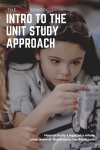Unit studies, sometimes called thematic units or integrated studies, are very popular with homeschoolers. Homeschool unit studies usually use a hands-on approach for effective learning. The child learns by actually experiencing or discovering through different methods and activities, rather than just reading a chapter from a textbook.
Studies show that children using unit study methods retain 45% more than those using a traditional approach.
The unit or theme part refers to the idea of studying a topic as a whole instead of several subjects. Thousands of years ago, the Greeks decided to break whole topics into subjects.
For example: most people think of water as a science subject. One way to look at water is as H2O—a chemistry subject—but, it is also art (a beautiful waterfall), history (the Red Sea), economics (water bill), theology (baptism), language arts (babbling brook, which is a metaphor), geography (the location of bodies of water), etc.
A unit study approach takes a topic and "lives" with it for a period of time, integrating science, social studies, language arts, math, and fine arts as they apply.
For example, a unit study about animals would include:
- Reading stories such as Charlotte's Web, Flicka, etc. (Literature)
- Writing stories about animals (Creative writing, capitalization, punctuation, etc.)
- Learning about the classification of animals (Science)
- Learning new words such as vertebrate and invertebrate (Vocabulary)
- Finding out which animals live on which continents (Geography)
- Reading stories about animals in the Bible (Bible)
- Examining man's relationship with animals throughout history (History)
Unit studies for homeschooling are especially beneficial if you are teaching more than one child. If you are using textbooks and workbooks to teach three children seven different subjects each, that's a WHOPPING twenty-one subjects to prepare and teach.
A family with three children using textbook methods might have one child studying the Civil War and another learning about Ancient Rome, while another is studying the American Revolution, all history subjects. For Science, one child may be studying plants, another the planets, and another reptiles. In Bible, one child may be studying Moses, another studying Joseph, and another studying Paul.
With unit studies, history, geography, art, music, science, and Bible can all be taught together to all ages. Each child studies the topic at his or her own level. This saves over half of your teaching and preparing time.
All children can go on field trips together, many projects can be done together, writing assignments and vocabulary words will be about the same topic, just on different levels. For example while studying animals, a younger child may be able to classify birds, mammals, and insects, while an older child would classify animals in much more detail, such as arachnids, crustaceans, etc. The older child learns and helps to teach the younger while the younger learns from the older.
Unit studies work well for children with different learning styles. Most unit studies give several options to learn about a topic.
For example: Study the history of slavery in the United States. Let your students choose how they want to study the subject and how they want to demonstrate what they’ve learned:
- Read about slavery in the encyclopedia
- Read a portion from a textbook
- Research from reference books in the library
- Read a historical fiction about slavery
- Read a biography about an enslaved person
- Watch a documentary
- Write a poem about slavery
- Do a web search on slavery
- Create a shadowbox depicting a plantation and enslaved people
- Draw or sketch a scene depicting a plantation and enslaved people
Give unit studies a try for subjects that you think will spark your children's interest. You might find that this style of homeschooling is for your family.
Robin Sampson is the author of several Heart of Wisdom unit studies including Ancient History: Adam to Messiah. Heart of Wisdom unit studies are Bible Centered studies utilizing the Charlotte Mason Approach and the Internet. These unit studies guide students through academic studies using living books, writing-to-learn activities, and Christian materials while interacting in a meaningful way with the massive amounts of information available on the Internet. The units are available on the Web. When you open the unit you can click on the link and it will take you directly to linked text, maps, photos, audio files, worksheets, instructions, etc. To learn more, visit Heart of Wisdom.






I have truly loved all of the info on your site! I getting ready to dive into homeschooling. And your words have shown me that I am capable of doing this and my reasons are totally valid. A fellow homeschooler referred me to your site. And I'm so glad she did! Thank you for reinforcing in me what's in my heart for my girl's!
I'm so pleased that you have found the site useful! Thanks for your comment.
I am loving your website! So easy to navigate. LOADS of info. And the reviews totally helped to redirect my decision on a specific curriculum. I was able to dig deeper into my homeschooling expectations and goals through all of your great advice, resources, and plan of action. THANK YOU!
We are so glad it has been helpful, Gail! Thanks for letting us know.